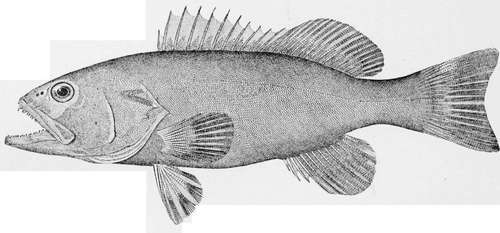Sheep's-Head-Diplodus Probatocephalus (Walt. )
Description
This section is from the book "American Game Fishes", by W. A. Perry. Also available from Amazon: American Game Fishes: Their Habits, Habitat, and Peculiarities; How, When, and Where to Angle for Them.
Sheep's-Head-Diplodus Probatocephalus (Walt. )
Grayish, with about eight vertical black bands, which are about as broad as the interspaces; dorsal dusky. Body robust, becoming very deep with age; the back compressed and elevated; axis of the body below the middle of the depth; snout entirely below axis of body; profile very steep; preorbital broad. Mouth low, horizontal; incisors broad, serrated in the young, then becoming emarginate and finally entire. Cheeks with six rows of scales; scales on breast very small, crowded. Dorsal spines very strong, higher than the soft rays, the last considerably shortened, so that the outline of the fin is emarginate; second anal spine very strong, nearly as long as the snout and eye; pectoral very long, reaching past the front of the anal; ventrals reaching vent. Head 3^; depth 1^3. D XII, 12; A. Ill, 10; Scales 7-45-16. L. 30 inches. Cape Cod to Texas; abundant.
The same rig that is used for Channel Bass-a two-piece bamboo rod, eight feet long, multiplying reel with drag, and one hundred yards of Cuttyhunk line, 15-thread. In Florida-fishing, the unexpected often happens, and while looking for a four-pound Sheep's-head, you may hook a twenty-five pound Bass or other runaway fish. Some anglers put the sinker at the end of the line, and tie the hooks eight or ten inches above. Others use round perforated sinkers, with the hooks below; the sinker, from one to two ounces in weight, lies on the bottom.
Only the best Virginia hooks can be trusted to resist the jaws of the Sheep's-head (No. 4 or 5) and these sometimes fail. A piece of hemp or cotton line rather thicker than the reel-line makes the best snood; no gut, however strong or doubled, will resist the teeth of the Sheep's-head. With two hooks, about eight or ten inches apart, the angler may often hang a pair, when, in the words of Dame Berners, "surely thenne is there noo man merrier than he is in his spyryte."

Black grouper.
Continue to:
